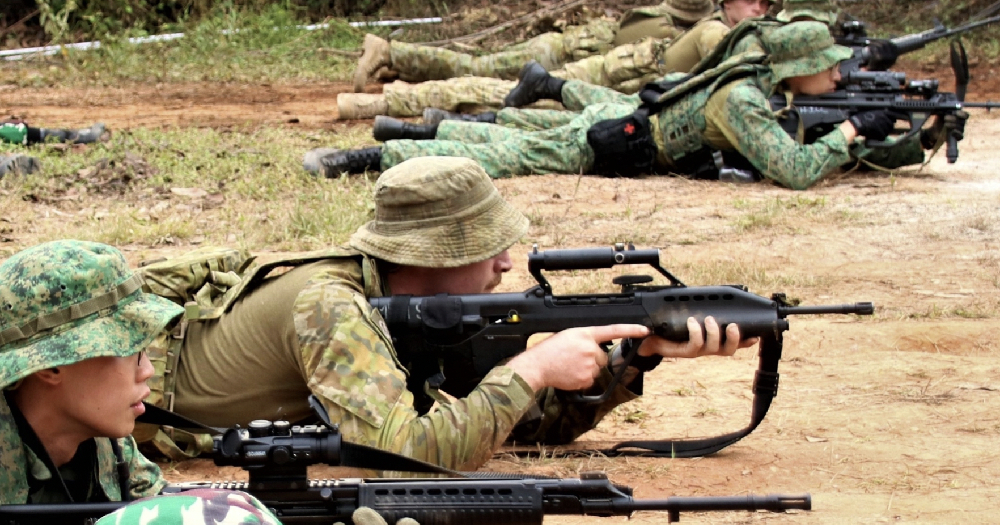Follow us on Telegram for the latest updates: https://t.me/mothershipsg
All of Singapore's international partners have given the country their assurances that they will continue to provide the Singapore Armed Forces (SAF) with access to overseas training grounds for the foreseeable future, Defence Minister Ng Eng Hen said on Monday (Sep. 12).
Ng was responding to a written reply to a parliamentary question asked by Workers' Party and Aljunied MP Gerald Giam, who asked if the SAF's longstanding training exercises in overseas territories, including those in Northeast Asia, face disruption due to "recent tensions in that region".
Singapore appreciates overseas training opportunities for SAF
Ng said that while there have been short-term disruptions to overseas training spaces in the initial phases of the Covid-19 pandemic, they have now resumed pre-Covid levels. He added that the SAF includes "some level of redundancy in its overall planning whether due to pandemics or other reasons".
"Singapore appreciates the training opportunities that foreign partners have provided to the SAF, that allow the conduct of exercises of a larger scale and complexity not possible locally due to limited land, sea or air space," Ng said.
"These opportunities reflect the strong and steady defence relations with our foreign partners that have been built up over many years."
Ng added that Singapore appreciates the training opportunities that foreign partners have provided to the SAF, as these opportunities allow the conduct of exercises of a larger scale and complexity not possible locally due to limited land, sea or air space.
He also said these opportunities reflect "the strong and steady defence relations" Singapore has with its foreign partners that have been built up over many years.
Recent tensions in the region
Both Giam and Ng have avoided naming any country or territory in particular, but China and Taiwan are involved in geopolitical tensions in the region that have recently heated up over U.S. House Speaker Nancy Pelosi's visit to the self-ruled island of Taiwan that Beijing considers as part of its territory.
In response, China held six live-fire drills in the waters surrounding Taiwan, sending five ballistic missiles into Japan's Exclusive Economic Zone in the process.
The unprecedented drills were often described by the media as retaliation for Pelosi's visit, which China said threatened its sovereignty.
However, the sheer scale and complexity of the drills -- for instance, the missiles were sent above the Kármán line, which meant they were in outer space and not Taiwan's airspace -- points to planning that has been underway for several months, as suggested by Taiwan News columnist Courtney Donovan Smith, and not simply a reactive move in direct response to Pelosi's visit, which was only rumoured in April and not confirmed till the very night when her plane landed on Aug. 2.
This lends credence to the argument that perhaps Pelosi's visit was used as justification for China to ramp up its rhetoric and continue on its series of punitive measures to pressure the island, given that visits to Taiwan by U.S. congressional delegations have taken place regularly over the years -- with 10 of such visits happening in 2022 alone before Pelosi's trip.
Project Starlight
The SAF conducts overseas training in a number of countries and regions, including Australia, Brunei, Germany, India, the U.S.
But perhaps it's Singapore's long-standing defence arrangement with Taiwan, codenamed Project Starlight, that has garnered some attention due to Singapore's political and security considerations.
The arrangement, which was agreed upon in 1975 by then-Prime Minister Lee Kuan Yew and then-Taiwanese Premier Chiang Ching-kuo to allow SAF to train in Taiwan, has persisted till this day, even after Singapore established formal diplomatic relations with China in 1990.
According to former Deputy Prime Minister and Senior Minister S. Jayakumar in his book Diplomacy: A Singapore Experience, Lee told Chinese Premier Hua Guofeng in his first visit to China in 1976 that Singapore's military training in Taiwan was unavoidable as Singapore had to train its troops wherever facilities were made available.
Lee reiterated this point to former Chinese Premier Li Peng during their 1990 meeting in Singapore.
Given China's "one China" principle, under which Beijing claims Taiwan as part of its territory, China tends to see any arrangement or move that Taiwan conducts independently with others as an act that threatens its territorial integrity.
Jayakumar also said in his book that in 1990, Singapore had an understanding with China about the training of Singapore's armed forces in Taiwan, as well as the continued exchange of visits between Singapore and Taiwanese leaders.
Despite China wanting Singapore to end our SAF training in Taiwan, as Jayakumar recounted, Singapore has continued with Project Starlight and declined China's offers of alternative training facilities to those in Taiwan.
The number of troops involved in this arrangement, however, has been reduced from around 10,000 to 3,000 each year, according to U.S.-based non-profit policy research outfit Global Taiwan Institute.
Top image via Ministry of Defence/Facebook
If you like what you read, follow us on Facebook, Instagram, Twitter and Telegram to get the latest updates.
